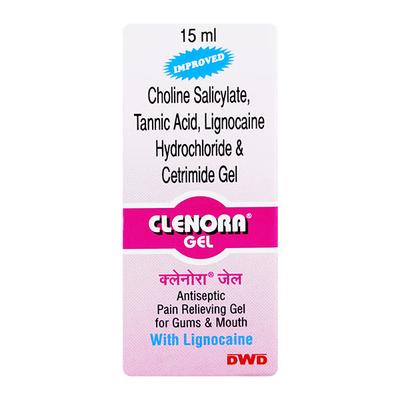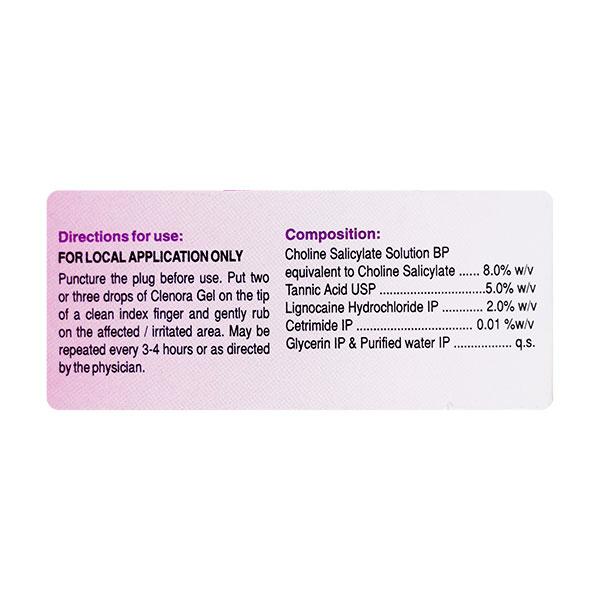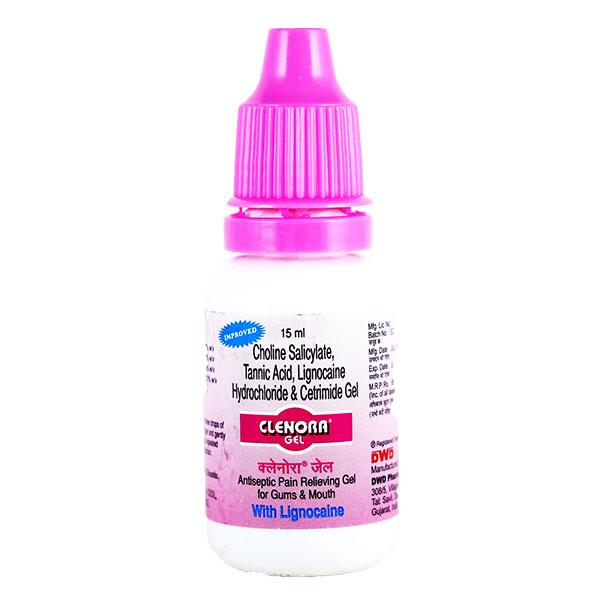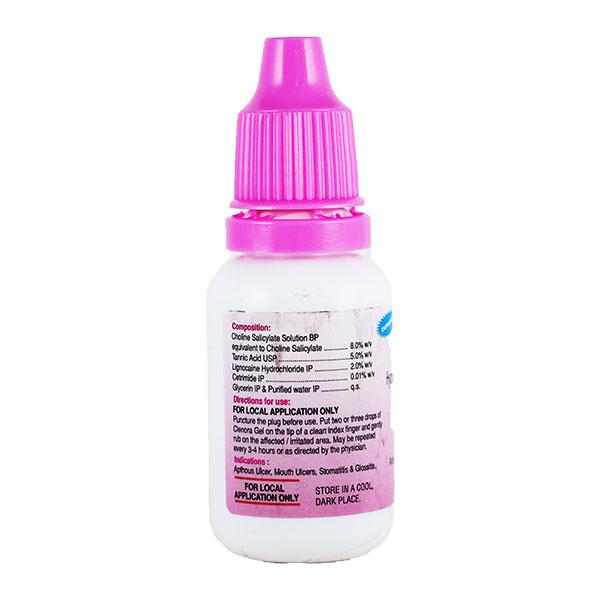

Netmeds First Membership
Quick Links
Introduction About CLENORA GEL(ORAL)
CLENORA GEL(ORAL) is a combination of Choline salicylate, Cetrimide, Lignocaine and Tannic acid which belongs to the group of medicines called Antiseptics, Non-steroidal anti-inflammatory drugs, Local Anaesthetics and Astringents respectively. It is used to manage mouth ulcers, aphthous ulcers, stomatitis (swollen and sore mouth), glossitis (swelling of the tongue), and gingivitis.
Do not use CLENORA GEL(ORAL) in patients with bleeding or inflamed skin, a history of chronic peptic ulcers, viral infections, or any skin infections. Before taking CLENORA GEL(ORAL) inform your doctor if you have asthma, liver and kidney disease, high blood pressure, a stomach ulcer or gastritis, thyroid disease, or diabetes.
CLENORA GEL(ORAL) is not considered safe during pregnancy. Consult your doctor before using. There is limited information on the use of CLENORA GEL(ORAL) during breastfeeding. CLENORA GEL(ORAL) should be used with caution in elderly patients. The most common side effects of using CLENORA GEL(ORAL) are nausea, vomiting, gastritis, bleeding, dry mouth, decreased taste sensation, and bad taste. Contact your doctor if any of the side effects worsen or persist for a longer period of time.
Uses Of CLENORA GEL(ORAL)
It is used to manage:
- Mouth ulcer
- Aphthous ulcers
- Stomatitis (swollen and sore mouth)
- Glossitis (swelling of the tongue)
- Gingivitis (gum inflammation)
How CLENORA GEL(ORAL) Works
CLENORA GEL(ORAL) is a combination medicine used to manage mouth ulcers. Cetrimide is an antiseptic that acts against microorganisms. Choline salicylate is an anti-inflammatory as well as analgesic; it relieves pain by inhibiting prostaglandin synthesis. Lignocaine is a local anaesthetic; it works by desensitizing the tissues, thus relieving pain, and tannic acid is an astringent; it works by creating a protective layer over the ulcer by producing its antiviral and antibacterial effects.
How to use CLENORA GEL(ORAL)
Apply CLENORA GEL(ORAL) as advised by your physician. It is for local applications only. Put two or three drops of CLENORA GEL(ORAL) on the affected area. It may be repeated every 3–4 hours or as directed by the physician. Depending on your age, body weight, and disease condition, your doctor will fix the duration for you.
Side Effects Of CLENORA GEL(ORAL)
Common
- Nausea
- Vomiting
- Gastritis
- Bleeding
- Dry mouth
- Decreased taste sensation
- Bad taste
How To Manage Side Effects
Nausea And Vomiting
Take the medicine with or just after a meal. Stick to simple meals. Avoid eating oily or spicy food. If the nausea and vomiting do not improve, consult your doctor.
Warning & Precautions
Pregnancy
ContraindicatedCLENORA GEL(ORAL) is not recommended for pregnant women. Contact your doctor before using CLENORA GEL(ORAL).
Breastfeeding
Consult your doctorThere is limited information on the use of CLENORA GEL(ORAL) during breastfeeding. Consult your doctor before using.
Allergy
ContraindicatedDo not use CLENORA GEL(ORAL) if you are allergic to Cetrimide, Choline Salicylate, Lignocaine, Tannic Acid, or any other ingredients in this medicine.
Use In Geriatrics
Use with CautionCLENORA GEL(ORAL) should be used with caution in elderly patients. Contact your doctor before using CLENORA GEL(ORAL).
Others
Do not use CLENORA GEL(ORAL) if you have:
- Bleeding or inflamed skin
- Have a history of chronic peptic ulcer
- Viral infections
- Skin infections
Before using CLENORA GEL(ORAL), inform your doctor if you have:
- Stomach ulcers or gastritis
- Thyroid
- Diabetes
Interactions
A. Drug-Drug interactions:
Before using CLENORA GEL(ORAL) inform your doctor if you are taking any of the following medicines:
- Warfarin (a medicine used to manage blood clots)
- Aspirin and ibuprofen (medicine used to manage pain)
- Medicine used to excrete uric acid (Ex. probenecid, benzbromarone)
- Antacids (medicine used to manage stomach ulcers)
- Corticosteroids (medicine used to reduce inflammation)
- Amiodarone (a medicine used to manage heart rhythm problems)
- Other local anaesthetics
- Cimetidine (a medicine used to manage ulcers)
Overdosage:
If you or anyone else accidentally uses too much of CLENORA GEL(ORAL), consult your doctor immediately or visit the nearby hospital.
Synopsis
| Drug | : | Cetrimide, Choline Salicylate, Lignocaine,and Tannic Acid |
| Pharmacological Category | : | Antiseptics, Non-steroidal Anti-inflammatory drugs, Local Anaesthetics and Astringents |
| Therapeutic Indication | : | Mouth ulcer, aphthous ulcers, stomatitis, and glossitis |
| Dosage Forms | : | Gel and gum paint |
More Information
Storage
- Keep CLENORA GEL(ORAL) out of reach of children
- Store CLENORA GEL(ORAL) below 25°C
FAQs About CLENORA GEL(ORAL)
Q: What is CLENORA GEL(ORAL) used for?
A: CLENORA GEL(ORAL) is used to manage mouth ulcers, aphthous ulcers, stomatitis (swollen and sore mouth), glossitis (swelling of the tongue), and gingivitis.
Q: Can I use CLENORA GEL(ORAL) during pregnancy?
A: CLENORA GEL(ORAL) is not recommended for pregnant women. Contact your doctor before using CLENORA GEL(ORAL).
Q: How does CLENORA GEL(ORAL) work?
A: CLENORA GEL(ORAL) is a combination medicine used to manage mouth ulcers. Cetrimide is an antiseptic that acts against microorganisms. Choline salicylate is an anti-inflammatory as well as analgesic; it relieves pain by inhibiting prostaglandin synthesis. Lignocaine is a local anaesthetic; it works by desensitizing the tissues, thus relieving pain, and tannic acid is an astringent; it works by creating a protective layer over the ulcer by producing its antiviral and antibacterial effects.
Q: What are the side effects of using CLENORA GEL(ORAL)?
A: The most common side effects of using CLENORA GEL(ORAL) are nausea, vomiting, gastritis, bleeding, dry mouth, decreased taste sensation, and bad taste. Contact your doctor if any of the symptoms get worse.
Q: How do I use CLENORA GEL(ORAL)?
A: Apply CLENORA GEL(ORAL) as advised by your physician. Remove the cap and applicator from the bottle. Put two or three drops of CLENORA GEL(ORAL) on the affected area. It may be repeated every 3–4 hours or as directed by the physician.
Q: Who should not use CLENORA GEL(ORAL)?
A: Do not use CLENORA GEL(ORAL) if you are allergic to cetrimide, choline salicylate, lignocaine, or tannic acid, have bleeding or inflamed skin, or have a history of chronic peptic ulcers, viral infections, or skin infections. Consult your doctor before taking it.
Q: What precautions must be taken while using CLENORA GEL(ORAL)?
A: Before using CLENORA GEL(ORAL), inform your doctor if you have stomach ulcers, gastritis, or diabetes.
Q: Can we swallow CLENORA GEL(ORAL)?
A: Always use CLENORA GEL(ORAL) as advised by your doctor. It is for external use only. Do not swallow. Consult your doctor immediately if you or anyone else accidentally uses too much of CLENORA GEL(ORAL).
Q: Can CLENORA GEL(ORAL) be taken with other medications?
A: Before using CLENORA GEL(ORAL), inform your doctor about all other medications and supplements, including prescription, non-prescription, or herbal products, you are currently taking.
Q: Is CLENORA GEL(ORAL) safe during breastfeeding?
A: There is limited information on the use of CLENORA GEL(ORAL) during breastfeeding. Consult your doctor before using.
Q: How to buy CLENORA GEL (ORAL) online?
A: If you wish to buy CLENORA GEL(ORAL) on Netmeds, you need a prescription from a registered medical practitioner. Netmeds has made buying online medicines easier for consumers and is one of India's leading online pharmacies.
References
1. KD Tripathi. Drugs Acting on Skin and Mucous Membranes, Antifungal Drugs, Local Anaesthetics. Essentials of Medical Pharmacology. Seventh Edition, 2013. Page – 887, 792, 366.
2. Padmaja Udayakumar. Antiseptics and Disinfectants. Pharmacology for Pharmacy Students. 2019. Page: 658.
3. Tannic Acid. ScienceDirect.com. [Accessed on 6th April 2024] https://www.sciencedirect.com/topics/agricultural-and-biological-sciences/tannic-acid
4. Tannic Acid. ScienceDirect.com. [Accessed on 6th April 2024] https://www.sciencedirect.com/topics/chemistry/tannic-acid
5. Lidocaine for mouth and throat. National Health Service. [Accessed on 6th April 2024] https://www.nhs.uk/medicines/lidocaine-for-mouth-and-throat/about-lidocaine-for-mouth-and-throat/
6. BCM Ltd Nottingham NG2 3AA. Electronic Medicines Compendium (EMC). [Revised in March 2017] [Accessed on 6th April 2024] https://www.medicines.org.uk/emc/files/pil.6734.pdf
7. Thornton and Ross Ltd. Electronic Medicines Compendium (EMC). [Revised in September 2020] [Accessed on 6th April 2024] https://www.medicines.org.uk/emc/files/pil.4819.pdf
8. Reckitt Benckiser Ireland Ltd. Health Products Regulatory Authority (HPRA). [Revised in July 2021] [Accessed on 6th April 2024] https://www.hpra.ie/img/uploaded/swedocuments/Licence_PA0979-001-003_23072021091444.pdf
9. Reckitt Benckiser Healthcare (UK) Limited. Electronic Medicines Compendium (EMC); [Revised in April 2021] [Accessed on 6th April 2024] https://www.medicines.org.uk/emc/files/pil.624.pdf
10. Pharmacy Retailing (NZ) Limited. New Zealand Data Sheet. [Revised in January 2018] [Accessed on 6th April 2024] https://www.medsafe.govt.nz/profs/Datasheet/x/Xylocainejelly.pdf
11. Yatin Bhole. Bi-Folate Mouth Ulcer Gel. [Accessed on 6th April 2024] https://drbhole.com/bi-folate-gel
12. Cetrimide. Mims.com. [Accessed on 6th April 2024] https://www.mims.com/malaysia/drug/info/cetrimide?mtype=generic
13. Choline Salicylate. Mims.com. [Accessed on 6th April 2024] https://www.mims.com/singapore/drug/info/choline%20salicylate?mtype=generic
14. Lignocaine. Drugs.com. [Accessed on 6th April 2024] https://www.drugs.com/cdi/lidocaine-gel.html
15. Tannic Acid. RxList.com. [Accessed on 6th April 2024] https://www.rxlist.com/tannic_acid/supplements.htm
Useful Diagnostic Tests
- Complete Blood Count (CBC)/ Hemogram
- Healthy Midlife Checkup
- Men Health Checkup - Advanced
- Complete Women Checkup
- Senior Citizen Checkup – Female
- Senior Citizen Checkup - Male
- Women Health Checkup - Essential
- Full Body Checkup - Gold
- Elderly Checkup - Female
- Elderly Checkup – Male
- Full Body Checkup – Silver












